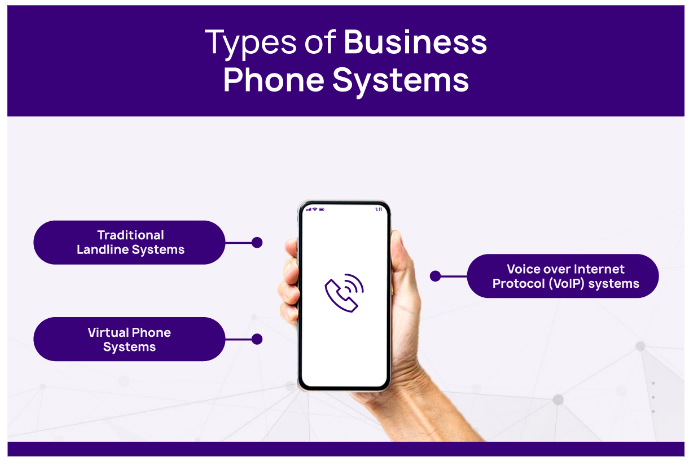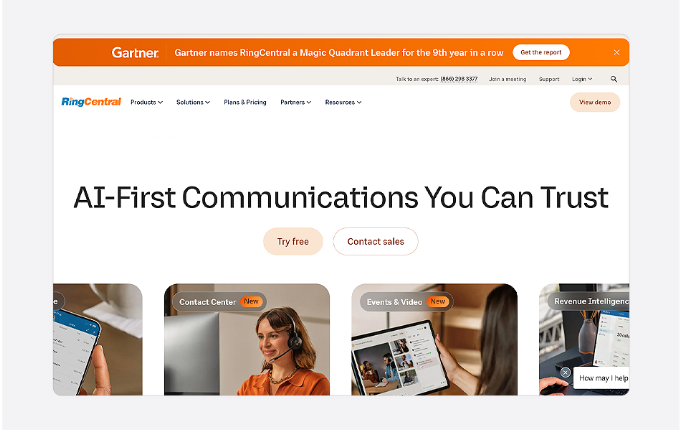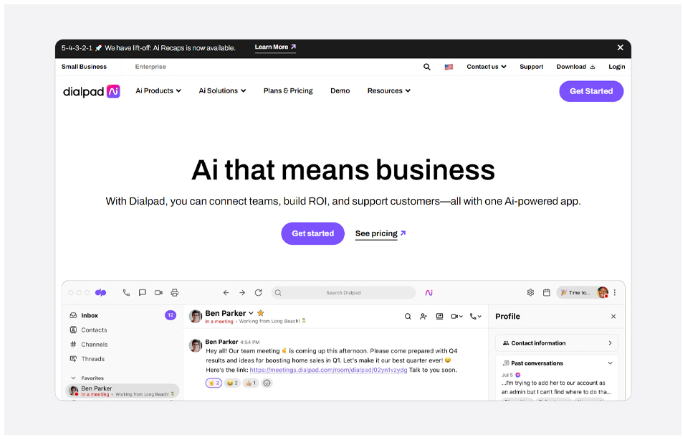How to Choose the Best Phone System for Small Business?

In this busy business world, a reliable phone system is not just a tool—it’s a necessity—it’s an asset that contributes to success. A business phone system is a business’s lifeline, a path to connecting with customers, streamlining business communication, and driving sales.
With so many phone systems available in the market, choosing one can be confusing. But fear not! We’ll help you find the perfect business phone system that fits your business needs and pocket.
In this article, we will discuss various types of phone systems available in the market, including traditional phone systems, VoIP, and Cloud-based ones. Also, we will discuss things to consider when choosing a reliable phone system provider.
So, let’s get started.
What are Business Phone Systems?
A business phone system, commonly known as a business telephone system, is a communication network designed specifically for business purposes. One key aspect of business phone systems is assigning a unique business phone number to the company, which facilitates professional communication with customers and employees.
The business phone system allows multiple users to make and receive calls and provides access to features like call transfer, voicemail, call forwarding, and integration with other platforms. However, features will vary depending on the type of business phone system you have, whether it’s a traditional phone line, a virtual phone system, or a VoIP system.
A traditional phone system requires physical lines to transmit calls, whereas a virtual or cloud phone system doesn’t require any physical lines; it uses an internet connection to manage incoming and outgoing calls.
But which business phone system is best for your business, and how do you choose one 🤔?
Keep following the article to know more.
Types of Business Phone Systems
There are a variety of business phone systems available to suit varied business needs and budgets. They are;

1. Traditional Landline Systems
For decades, we have relied on traditional landline phones for communication. For voice communication, traditional phone systems rely on physical infrastructure, such as copper wires, and on-site hardware, such as PBXs (Private Branch Exchanges).
Traditional Landline systems limit business scalability because of their limited features and phone lines. Also, installing and maintaining them is expensive and time-consuming.
2. Voice over Internet Protocol (VoIP) systems
VoIP stands for Voice Over Internet Protocol, a communication technology that lets you make phone calls and consume multimedia content over the internet. It is an open standard for making calls via the internet.
VoIP is known for its clear and concise communications efficiency, reliability, and cost-effectiveness compared to traditional phone systems. It is a new way of communication that is overtaking traditional landline phones that depend on wired connectivity.
The working mechanism of VoIP is that it converts analog voice signals into digital data packets for transmission. Also, it works on any smart or internet-enabled device, such as smartphones, laptops, and computers.
A wide range of features, such as video conferencing, voicemail to email, and call forwarding, make VoIP a highly scalable, accessible, and adaptable communication system.
VoIP systems also seamlessly integrate with business communication platforms like video conferencing and instant messaging, facilitating smooth communication and increased engagement between employees and customers.
3. Virtual phone systems
Virtual phone systems, commonly known as cloud phone systems, are internet-based communication technology whose primary target is business. Virtual phone systems are hosted and managed by a third party in the cloud, eliminating the need for space.
Virtual phone systems allow users to make and receive calls through the Internet instead of wired phone lines. In addition, they provide call forwarding, auto attendants, voicemail to email, robust security, private phone call, and more. These phone systems are ideal for any business as they are scalable, cost-effective, and reliable.
Best Business Phone Systems of 2024
Businesses are rapidly shifting and preferring innovative phone systems with diverse features and functionality. With that said, here are some of the best business phone systems of 2024:
1. KrispCall

Trusted by 4500 companies worldwide, KrispCall is a popular business cloud phone system that caters to the needs of modern businesses, from startups to large-scale enterprises.
What sets KrispCall apart from the competition is its wide range of features. You get to use a wide range of features, such as a Unified Callbox, IVR, Call forwarding, call routing, auto-attendant, call recording, contact tagging, voicemail, voicemail-to-email, and many more with KrispCall.
Furthermore, KrispCall is a very scalable and reliable solution. It’s hassle-free to add or remove users and features make it a suitable option for your businesses that want to streamline communication and tap into the global market. Moreover, you can also get second phone number from KrispCall for personal use or for your business. It provides privacy, organize your business communication, and cost-effectiveness for managing professional communication.
Features of KrispCall:
- Unified Callbox
- Contact Tagging
- IVR
- Call Forwarding
- Bulk SMS
- Call Routing
- Call Recording
Pricing of KrispCall
| Plan | Pricing |
| Essential | $15/user/month |
| Standard | $40/user/month |
| Enterprise | Custom |
2. RingCentral

Ringcentral is another reliable business cloud phone system. This phone system has several call, message, and collaborative features, as well as AI-powered tools to communicate in a smarter way with customers and teams.
Moreover, RingCentral’s dashboard is easy to navigate, and it offers seamless integration with other popular business tools, making the software easy to use. Furthermore, they offer a scalable solution to businesses of all sizes, providing flexibility and reliability.
Features of RingCentral:
- Business and toll-free numbers
- Call recording
- Business SMS
- Call Log Reports
- Interactive Voice Response (IVR)
Pricing of RingCentral
| Plan | Pricing |
| Core | $30/user/month |
| Advanced | $35/user/month |
| Ultra | $45/user/month |
3. Nextiva

Nextiva is another popular virtual phone system among businesses. This phone system offers features like voice and video conferencing, instant messaging, call queues, etc.
In addition, it is known for best analytics and reporting, which provide businesses with valuable insights into their communication. Companies can use these data to identify areas for improvement and enhance their communication strategies.
Features of Nextiva
- Call screening
- Unlimited online faxing
- SIP Trunking
- Conversational AI
- VoIP Caller ID
Pricing of Nextiva
| Plan | Pricing |
| Essential | $25.95/user/month |
| Professional | $30.95/user/month |
| Enterprise | $40.95/user/month |
4. Dialpad

Dialpad is another unique cloud-based communication software that uses artificial intelligence (AI) to help businesses connect, collaborate, and communicate effectively.
Dialpad offers innovative features like transcriptions, sentiment analysis, and employee coaching. With these features, businesses can improve customer service, get better insights, and coach employees to be more productive and efficient.
Features of Dialpad
- High-definition phone calls
- Virtual receptionist
- Visual Voicemail
- Call Park
- Simultaneous ring
Pricing of Dialpad
| Plan | Pricing |
| Standard | $23/user/month |
| Pro | $35/user/month |
| Enterprise | Based on requirements |
Key Factors to Consider When Choosing a Business Phone Service Provider
It’s crucial to thoroughly analyze several factors before choosing a business phone system. Make sure the providers offer all the features catering to your needs.
With that said, here are some key factors to consider when choosing a business phone service provider:
1. Features and Functionality Offered by the System
To ensure the smooth operation of your business, you must identify the features and functionality that meet your goals. Features like a virtual receptionist, auto attendant, call recording, and integration might help you boost productivity.
Making a list of must-haves and nice-to-haves can help you make informed decisions. This will allow you to meet your needs without incurring additional expenses.
2. Pricing Plans and Scalability Options
Allocate your budget and carefully evaluate different providers to find one that best fits your needs. Compare pricing offered by other providers and assess their scalability options. Find the right balance between scalable, reliable, and affordable plans before you finalize.
Moreover, ensure there are no hidden costs and check if the provider offers packages that suit your needs. Lastly, consider hardware, installation, and maintenance fees.
3. Customer Support Quality and Availability
What if you experience issues with your phone service provider? What if your provider’s customer support is poor?
To resolve any issue as quickly as possible, it is crucial to have a reliable and effective customer support system. You need to assess the service provider’s customer support quality by evaluating their response time through customer support channels.
Furthermore, it’s important to ensure that customer support is available 24/7 through easily accessible phone, email, and live chat channels. As a result, customers can receive assistance whenever they need it.
4. System Uptime and Reliability
A phone system’s reliability is crucial for avoiding communication breakdowns between employees, customers, or business partners. Even a short breakdown can cost businesses a lot. Make sure that your provider guarantees system uptime and minimizes downtime costs and times.
Additionally, look at the provider’s track record for reliability and uptime. Make sure the providers have strong infrastructure, data centers, and backup systems to ensure uninterrupted service in emergencies.
Conclusion
To conclude, you should complete your research before selecting the best business phone system. With Numerous providers available on the market, take your time to review each provider and choose the one that fits your budget and requirements best.
When selecting your business’s phone system, it’s important to consider factors such as pricing, features and functionality, customer support, reliability, etc. Make sure the phone system’s features and functions align with business needs and existing systems. Most importantly, ensure your chosen phone system is reliable, scalable, affordable, and offers effective customer service.
Analyzing these factors carefully can help you choose a phone system that matches your business communication needs, boosts productivity, and supports long-term growth.
Frequently Asked Questions (FAQs)
- What is a PBX system for small businesses?
Private Branch Exchange systems, or PBXs, enable businesses to transfer calls internally and externally within an organization. There are two types of PBX systems: traditional PBXs, which rely on copper lines and physical hardware, and IP PBXs, which transmit digitally via the Internet.
- What are the different types of business phones?
There are several types of business phones, such as Key service utility(KSU), Private Branch Exchange(PBX), Voice over Internet Protocol (VoIP), and Virtual cloud-based phone systems.
- How much does a business phone system cost?
The cost depends on the businesses’ usage and requirements, but on average, a traditional PBX system can cost between $500 and $2000 depending on the size and installation, and a cloud-based VoIP or Virtual phone system costs between $15 and $40 per user per month.






